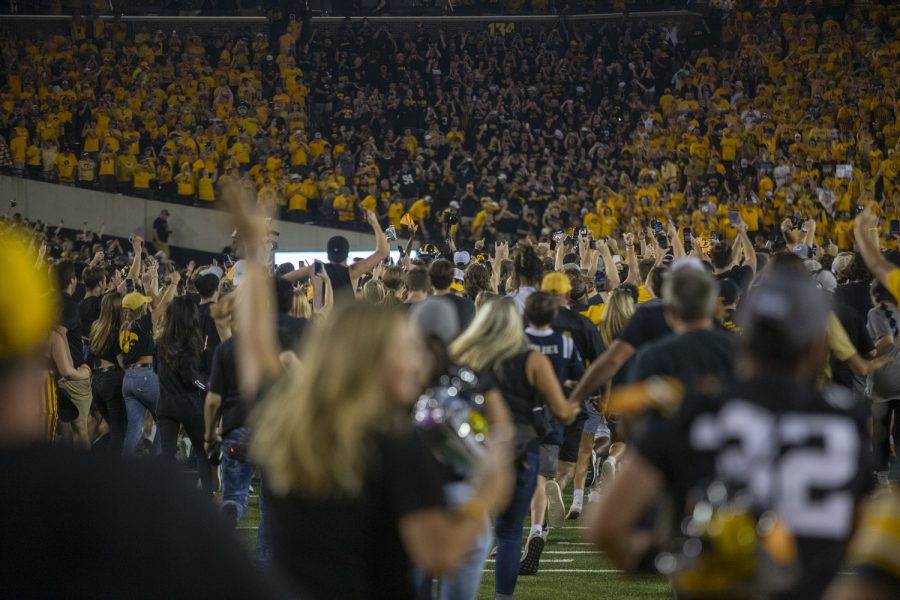Opinion | The problems with ‘stan’ culture
When fandom goes too far, it can lead to dangerous outcomes and leave negative impacts on society.
Iowa fans rush the field after a football game between No. 3 Iowa and No. 4 Penn State at Kinnick Stadium on Saturday, Oct. 9, 2021. The Hawkeyes defeated the Nittany Lions 23-20.
June 12, 2022
Fan culture and celebrity obsession has always been, in most instances, terrible.
One could go all the way back to the days when Star Wars fans harassed the child actor Jake Lloyd for “ruining their childhood” by being in Star Wars Episode I. The harassment led him to quit acting. More recent examples include praise of politicians to cultish degrees and fandoms who dedicate their entire existence to following idols.
This issue has become progressively worse through the advent of social media with harassment campaigns surfacing across platforms. This trend is going in a worrying direction and can lead to dangerous outcomes.
The term ‘stan’ was popularized by the release of Eminem’s 2000 song “Stan.” Stan can be defined as an extremely or excessively enthusiastic and devoted fan. It has become a popular term often attached to fans of Korean pop bands such as BTS, or musical stars like Calvin Harris or Nicki Minaj.
This sort of fan culture is even found here in Iowa. While not always about celebrities, stans of sports teams can be just as enthusiastic and devoted. Just like other fandoms, stans of sports teams can go to extreme measures to promote their team.
In a 2021 home football game against Penn State, Hawkeye fans booed Penn State when they faced off and then proceeded to storm the field like a herd of ferocious animals instead of human beings.
Some could argue that this is merely an indication of our tendency as mammals to behave in a tribal manner, seeking comfort in the idea that there are others who stand alongside us. But with the extreme polarization encouraged by social media, echo chambers encourage these behaviors. This can result in the most mentally vulnerable being indoctrinated into these parasocial relationships.
Going back to the behavior of Hawkeye fans during football games, comfort can be found in knowing this is a bigger problem with college football fans in general. Other sports in Iowa are not likely to be shielded from this toxic fandom and behavior for much longer, if it has not already made itself present there.
Being passionate about something you like or believe in is fine. Whether that be a musician or band you really enjoy, a sports team you follow, political beliefs, religion, or fandoms you are part of, it is not a bad thing to enjoy or partake in them.
But as the last few years are beginning to show us, these fan groups and cultures are attracting the worst type of behavior from their members and the consequences seem to be becoming more and more dangerous. If you like any of these things, it is okay: but do not obsess over them.
Columns reflect the opinions of the authors and are not necessarily those of the Editorial Board, The Daily Iowan, or other organizations in which the author may be involved.














